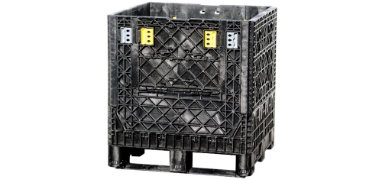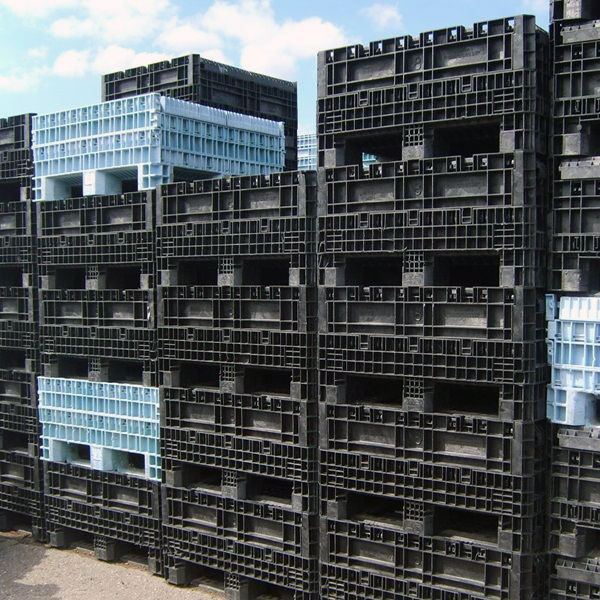Save space and resources with used bulk containers for commercial storage needs
Why Bulk Containers Are Necessary for Sustainable and Cost-efficient Transport
Mass containers play an essential role in contemporary logistics. They help with the reliable motion of huge quantities of goods, thereby enhancing transport processes. This technique not only reduces costs but additionally minimizes environmental impact via lower emissions and waste generation. As sectors seek even more lasting practices, the adoption of mass containers is coming to be significantly substantial. What ramifications does this shift hold for future logistics and supply chain administration?

The Benefits of Utilizing Mass Containers in Logistics
Bulk containers transform logistics by boosting performance and sustainability. These containers permit the transportation of large quantities of items in a solitary trip, substantially lowering the variety of trips needed. This not just enhances procedures yet additionally minimizes labor costs connected with handling, loading, and unloading. On top of that, bulk containers are designed to optimize space usage within transport cars, ensuring that more items can be delivered simultaneously.
The standardization of bulk containers additionally streamlines the logistics procedure. With consistent dimensions, they can be conveniently piled and saved, bring about boosted stockroom administration. Additionally, mass containers often include long lasting materials that safeguard contents from damages throughout transportation, thereby lowering product loss and increasing total dependability. Consequently, companies can experience improved supply chain performance, inevitably resulting in increased earnings and customer satisfaction. This mix of factors makes mass containers a vital asset in modern-day logistics.
Environmental Influence: Decreasing Waste and Carbon Impact
As industries progressively focus on sustainability, the adoption of bulk containers has actually become an essential method for reducing waste and reducing carbon impacts. These containers minimize making use of product packaging materials, such as boxes and plastic, thereby significantly lowering general waste generation. By combining deliveries, bulk containers boost transportation performance, permitting for more products to be transported per trip. This reduction in journeys directly associates with lower greenhouse gas discharges, adding to a smaller carbon impact.
Mass containers can frequently be recycled or reused, better minimizing ecological influence. The durability of these containers assurances they can hold up against multiple transport cycles, decreasing the requirement for single-use choices. used collapsible bulk containers. By improving logistics and promoting effective resource use, bulk containers not only support sustainable techniques yet additionally urge industries to align with international ecological objectives. Eventually, their application mirrors a dedication to environmental stewardship and liable source monitoring
Price Savings: How Mass Containers Lower Transport Costs
While lots of business seek ways to enhance their bottom line, the usage of mass containers provides a considerable chance for reducing transportation costs. Bulk containers make the most of the volume of items delivered, enabling companies to ship bigger quantities at the same time. This effectiveness decreases the variety of trips called for, directly reducing fuel expenses and reducing labor expenditures related to loading and unloading.
Furthermore, bulk containers usually feature structured designs that maximize area utilization within transportation vehicles. This suggests fewer voids, bring about a lot more effective use available ability. Additionally, the resilience of mass containers can lower the threat of product damage throughout transportation, making certain and reducing losses that even more items show up undamaged.
Enhancing Supply Chain Effectiveness With Mass Storage Solutions
Bulk storage space solutions play an important function in improving supply chain effectiveness by maximizing inventory administration. By combining items into fewer, bigger containers, businesses can substantially reduce dealing with expenses related to constant transfers and handling. This structured approach permits better tracking and administration of stock, eventually bring about boosted functional efficiency.
Streamlined Supply Management
Reliable supply monitoring is essential for optimizing supply chain operations, especially when organizations embrace bulk storage space options. These remedies make it possible for services to maintain higher supply degrees while minimizing the frequency of replenishment. By settling products right into bulk containers, companies can streamline their supply procedures, reducing the complexity related to tracking multiple smaller plans. This technique assists in precise stock counts and boosts forecasting accuracy, permitting more enlightened decision-making. On top of that, bulk storage space remedies streamline storehouse organization, making it easier to find and gain access to products when required. Therefore, companies can achieve an extra effective inventory turn over price, eventually improving total supply chain efficiency and minimizing the probability of stockouts or overstock scenarios.

Reduced Handling Prices
The implementation of mass storage space remedies not just enhances stock administration but also considerably minimizes dealing with prices across the supply chain. By settling products right into bulk containers, firms minimize the requirement for frequent handling and transfer in between different storage and transport units. This method minimizes labor prices related to loading, unloading, and moving smaller bundles. In addition, bulk storage space lowers the regularity of deliveries, leading to lower transportation expenses and reduced gas consumption. Consequently, organizations can enhance their logistics operations, permitting for an extra efficient allowance of resources. Inevitably, reduced handling costs contribute to enhanced overall supply chain efficiency, fostering an environment that supports both sustainability and economic viability.

Versatility of Bulk Containers Throughout Different Industries
Lots of sectors have distinct requirements for transportation and storage space, mass containers have actually arised as a versatile option that fulfills a vast range of requirements. These containers, varying from big containers to specialized tanks, can suit diverse materials, including liquids, powders, and granules. In the farming industry, bulk containers assist in the transportation of plant foods and grains, while the food and beverage sector uses them for active ingredients and ended up items. The chemical market counts on bulk containers for safely delivering harmful materials, making sure compliance with safety regulations. Additionally, building companies benefit from bulk containers for moving aggregates and other materials. Their adaptability encompasses various modes of transportation, including ships, trains, and trucks, enhancing logistical effectiveness. This adaptability not just simplifies operations across various markets however likewise promotes sustainability by lowering packaging waste and optimizing area in transit. Therefore, bulk containers play a crucial role in modern supply chain administration.
Future Trends wholesale Container Use and Sustainability
The future of bulk container use is progressively formed by ingenious products advancement that enhances sustainability. In addition, automation in logistics promises to enhance operations, minimizing waste and improving effectiveness. Embracing circular economy methods will certainly better transform just how bulk containers are designed, utilized, and reused, promoting a much more lasting transportation landscape.
Cutting-edge Materials Development
As sectors progressively focus on sustainability, innovative materials advancement in mass containers becomes a substantial consider boosting green transportation remedies. Researchers and suppliers are exploring naturally degradable plastics, recycled compounds, and lightweight steels to lower environmental influence. These materials not only lessen waste yet also enhance gas efficiency by reducing the general weight of containers. In addition, improvements in clever materials, which can adapt to varying conditions, enhance the longevity and capability of mass containers. The assimilation of these cutting-edge products aligns with circular economic climate principles, promoting reuse and recycling. As the demand for lasting methods expands, the advancement of such materials will play an important role in shaping the future of bulk container usage in logistics and transportation.
Automation in Logistics
Considerable innovations in automation are positioned to transform logistics and the usage of bulk containers, enhancing sustainability in transport. Automated systems, consisting of drones and independent lorries, are simplifying the motion of bulk containers, decreasing the reliance on typical fuel-powered transportation. These innovations optimize routing and loading procedures, improving and minimizing empty miles gas performance. Furthermore, automated stock monitoring systems boost monitoring and tracking of bulk containers, making sure far better resource allotment and reduced waste. The combination of the Net of Things (IoT) permits real-time information analysis, allowing positive decision-making that lines up with sustainability objectives. As automation continues to evolve, it is anticipated to drive additionally advancements wholesale container usage, inevitably supporting even more lasting logistics practices and lowering the environmental influence of transportation.
Round Economy Practices
Innovations in automation are setting the phase for a more incorporated method to round economic climate techniques in the domain name of bulk container use. As sectors increasingly welcome sustainability, bulk containers are being made for longevity and reusability. This change not just minimizes waste however additionally boosts resource effectiveness. Business are taking on techniques such as closed-loop systems, where utilized containers are accumulated, refurbished, and reestablished right into the supply chain. get more info Furthermore, wise technologies track container life cycles, promoting better administration and minimizing environmental influence. The collaboration between manufacturers, logistics carriers, and end-users is important in establishing requirements for sustainable container use. used collapsible containers. Future trends indicate a growing focus on products that are recyclable and biodegradable, additional strengthening the round economic climate's concepts in mass transport

Frequently Asked Concerns
What Materials Are Mass Containers Normally Made From?
Bulk containers are typically created from resilient products such as high-density polyethylene, light weight aluminum, cardboard, and steel. These materials supply toughness, security, and versatility, making them appropriate for delivering numerous products in various industries successfully.
How Do I Select the Right Size Bulk Container?
Selecting the ideal size bulk container involves assessing the volume of materials to be transferred, considering dealing with equipment compatibility, and appraising storage space needs. Correct dimension guarantees effectiveness in transportation and lessens waste throughout delivery.
Are Bulk Containers Reusable or Recyclable?
Bulk containers are often multiple-use, made for several trips, enhancing sustainability. Many can also be reused, depending on the materials made use of. Picking recyclable alternatives better sustains ecological goals and minimizes waste in transportation methods.
What Safety Regulations Relate To Bulk Container Transportation?
Safety and security laws for bulk container transport include compliance with the Division of Transportation guidelines, correct labeling of unsafe materials, architectural stability evaluations, and adherence to weight limits to guarantee risk-free handling and avoid accidents throughout transit.
How Can Companies Change to Utilizing Mass Containers Efficiently?
Organizations can change to bulk containers by reviewing current logistics, educating team on handling, purchasing ideal equipment, optimizing inventory monitoring, and working together with distributors to assure compatibility and effectiveness throughout the supply chain.
As sectors progressively prioritize sustainability, the adoption of bulk containers has arised as an essential method for minimizing waste and reducing carbon impacts. By consolidating materials into mass containers, firms can enhance their stock processes, decreasing the complexity associated with tracking several smaller sized plans. As industries progressively prioritize sustainability, cutting-edge materials development in bulk containers emerges as a substantial variable in enhancing environment-friendly transport remedies. Automated systems, consisting of drones and independent vehicles, are streamlining the movement of bulk containers, decreasing the reliance on standard fuel-powered transport. Furthermore, automated stock administration systems improve tracking and tracking of bulk containers, guaranteeing much better resource allocation and decreased waste.